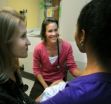(Press-News.org) A daily dose of acetylsalicylic acid equivalent to a fourth of an aspirin may slow the decline in intellectual capacity among elderly individuals with high cardiovascular risk.
This is shown in a study by Sahlgrenska Academy, University of Gothenburg, Sweden.
Researchers at Sahlgrenska Academy, University of Gothenburg, over a five year period studied how intellectual capacity changes among 681 elderly women (70 to 92 years) with heightened risk of suffering from a heart attack, vascular spasm or stroke.
Of the 681 women, 129 received a low daily dose of acetylsalicylic acid, equivalent to a fourth of an aspirin, to prevent heart disease. The Gothenburg study shows that acetylsalicylic acid also slowed decline in brain capacity among the elderly women.
In the study, published in British Medical Journal Open, the women underwent various tests to measure their physical health and intellectual capacity, such as language and memory tests.
"At the end of the five year examination period mental capacity had declined among all the women and the portion that suffered from dementia was equally large in the entire group. However, the decline in brain capacity was significantly less and occurred at a slower pace among the women who received acetylsalicylic acid," says Silke Kern, researcher at Sahlgrenska Academy.
The effect remained even when age, genetic factors and use of anti-inflammatory drugs were taken into account.
In addition to preventing heart disease, acetylsalicylic acid has been shown to be effective against cancer according to several scientific studies. It is common practice in many countries to treat women at risk for heart disease with a small dose of acetylsalicylic acid – but not in Sweden.
Silke Kern emphasizes that the study is an observational study and that more research is necessary before any definitive conclusions can be made.
"Our results indicate that acetylsalicylic acid may protect the brain, at least among women at high risk for a heart attack or stroke. However, we do not know the long term effects of routine treatment. We certainly do not want to encourage the elderly to self-medicate with aspirin to avoid dementia," she states.
The research group in Gothenburg has now started a follow-up study that will follow the older women for an additional five years.
### The study Does low-dose acetylsalicylic acid prevent cognitive decline in women with high cardiovascular risk? A 5-year follow-up of a non-demented population-based cohort of Swedish elderly women was published in BJM Open on October 3, 2012.
Link to the article: http://bmjopen.bmj.com/content/2/5/e001288.long
Contact:
Silke Kern, researcher at Sahlgrenska Academy, University of Gothenburg
+46 76-2365332
silke.kern@vgregion.se
Aspirin may slow the decline in mental capacity among elderly patients
2012-10-22
ELSE PRESS RELEASES FROM THIS DATE:
The hidden threat posed by inconspicuous stripes
2012-10-22
Patterns fascinate. Particularly stripes. Found in nature in zebras, they are also found in the most unlikely places, such as powdered drugs' mixing vessel walls. In an article about to be published in EPJ E, Nirmal Thyagu and his colleagues from Rutgers University, New Jersey, USA, propose a traffic model to predict the formation of different patterns, ranging from stripes to spots.
Thanks to simulations, Thyagu and colleagues showed the underlying stripe formation mechanism, which they propose stems from traffic-like jams, whereby particles move more slowly when surrounded ...
Saving time, saving lives
2012-10-22
Istanbul, 22 October 2012: Experts in emergency cardiac care from around the world met in Istanbul to discuss ways to improve outcomes in patients with acute cardiac disease. This was the first annual meeting of the newly launched Acute Cardiovascular Care Association (ACCA) of the European Society of Cardiology (ESC) (1). The congress concludes today.
"The key message is that time saves lives," said Professor Tom Quinn, United Kingdom, member of the ACCA Board. "In cardiac emergencies, such as a heart attack, calling an ambulance immediately ensures the patient gets ...
Immune cells of the blood might replace dysfunctional brain cells
2012-10-22
This press release is available in German.
The immune system is comprised of multiple cell types each capable of specialized functions to protect the body from invading pathogens and promote tissue repair after injury. One cell type, known as monocytes, circulates throughout the organism in the blood and enters tissues to actively phagocytose (eat!) foreign cells and assist in tissue healing. While monocytes can freely enter most bodily tissues, the healthy, normal brain is different as it is sequestered from circulating blood by a tight network of cells known as the ...
Mock clinical exams boost pediatric residents' comfort in addressing breastfeeding
2012-10-22
AUGUSTA, Ga. – A simulated clinical experience guiding future pediatricians through interactions with breastfeeding moms appears to put the doctors at ease with the sensitive and important health topic, researchers say.
"We showed that their confidence and comfort increased with the OSCE (Objective Structured Clinical Examination) interventions," said Dr. Kathryn McLeod, a pediatrician and educator at the Medical College of Georgia at Georgia Health Sciences University who developed the three simulated patient exams.
Breastfeeding education typically falls to pediatricians ...
Gastric bypass surgery just as effective in teenagers as in adults
2012-10-22
Teenagers with severe obesity can benefit from gastric bypass surgery just as much as adults. A study by Sahlgrenska Academy, University of Gothenburg, Sweden and Karolinska Institutet, Sweden found that 81 teenagers lost an average of 96.8 pounds following surgery, significantly improving their health and quality of life.
The study, published by the International Journal of Obesity, involved eighty-one 13-18 year-olds who had gastric bypass surgery, which had previously been performed on people younger than 18 in exceptional cases only.
The new study found that gastric ...
Want the shortest path to the good life? Try cynicism
2012-10-22
Are cynics and happiness mutually exclusive? For modern cynics, perhaps. But for the ancient Cynics, not necessarily.
Research by the University of Cincinnati's Susan Prince shows that despite the historical perception of the ancient Cynics as harsh, street-corner prophets relentlessly condemning all passersby and decrying society's lack of virtue, these Greek philosophers, indirectly descended from Socratic teaching, weren't all doom and gloom. They actually might have espoused a shortcut to happiness.
"We don't have good scholarship on the Cynics. They're seen as ...
Rejecting arsentate
2012-10-22
Not long ago, some unassuming bacteria found themselves at the center of a scientific controversy: A group claimed that these microorganisms, which live in an environment that is rich in the arsenic-based compound arsenate, could take up that arsenate and use it – instead of the phosphate that all known life on Earth depends on. The claim, since disproved, raised another question: How do organisms living with arsenate pick and choose the right substance?
Chemically, arsenate is nearly indistinguishable from phosphate. Prof. Dan Tawfik of the Biological Chemistry Department ...
3D structure of an unmodified G protein-coupled receptor in its natural habitat
2012-10-22
Scientists have determined the three-dimensional structure of a complete, unmodified G-protein-coupled receptor in its native environment: embedded in a membrane in physiological conditions.
Using NMR spectroscopy, the team mapped the arrangement of atoms in a protein called CXCR1, which detects the inflammatory signal interleukin 8 and, through a G protein located inside the cell, triggers a cascade of events that can mobilize immune cells, for example.
Because G protein-coupled receptors are critical for many cellular responses to external signals, they have been ...
Stem cell bodyguards
2012-10-22
Hiding deep inside the bone marrow are special cells. They wait patiently for the hour of need, at which point these blood forming stem cells can proliferate and differentiate into billions of mature blood immune cells to help the body cope with infection, for example, or extra red blood cells for low oxygen levels at high altitudes. Even in emergencies, however, the body keeps to a long-term plan: It maintains a reserve of undifferentiated stem cells for future needs and crises. A research team headed by Prof. Tsvee Lapidot of the Institute's immunology Department recently ...
Alarming increase in malignant melanoma on the west coast of Sweden
2012-10-22
Malignant melanoma is as much as 35% more common among people who live in Gothenburg and the region's coastal municipalities than those who live inland. Researchers at Sahlgrenska Academy, University of Gothenburg, Sweden, have found that the number of malignant melanoma cases in the Västra Götaland region has quadrupled since 1970.
Malignant melanoma has become increasingly common in the Western world over the past few decades. One of the biggest factors has been excessive and unprotected sunbathing despite widespread awareness of the health risks.
Melanoma takes a ...

